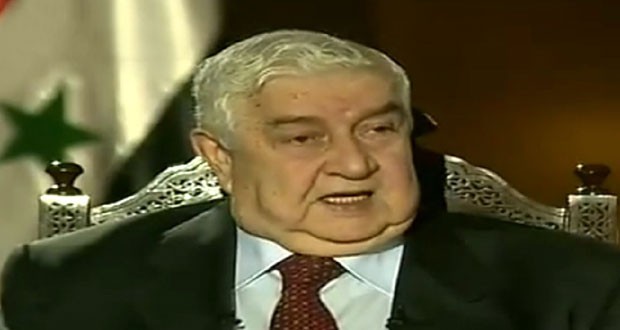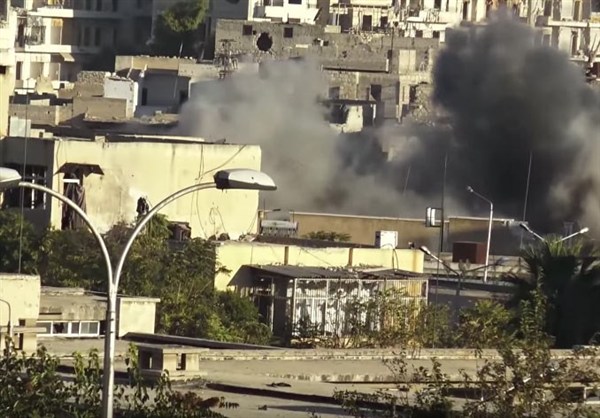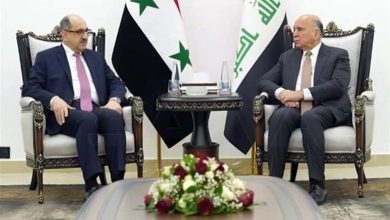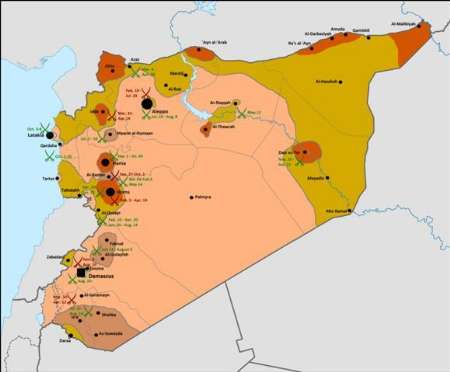Al-Moallem: Israel is key part of conspiracy, we will put every effort to make Moscow meeting a success

Deputy Prime Minister, Foreign and Expatriates Minister Walid al-Moallem stressed that Israel is an essential part of the conspiracy against Syria, noting that the government is commissioned to help make Moscow meeting a success.
Al-Moallem stressed in an interview with the Syrian al-Ikhbariya TV channel, aired Tuesday evening, that Israel seeks, through the US, to prolong the crisis in Syria as much as possible.
He dismissed Israel’s aggression in the southern province of Quneitra, which took place few days ago, as “transgression against the Syrian sovereignty and a brazen act of aggression against the Syrian territory.”
The Israeli aggression, he added, constituted a breach of the UN-monitored Disengagement Accord of 1974, and it is not a matter of wonder that the UN should have admitted observing Israeli drones in the Syrian sky.
“Is Israel stupid to have carried out this act of aggression while it knows that it will pay for it,” wondered al-Moallem, stressing that Israel is a fundamental part of the conspiracy targeting Syria.
The Israeli enemy, he clarified, has been using Jabat al-Nusra terrorist organization and other factions in southern Syria and has directly intervened to protect those from the Syrian Arab Army of the “popular resistance” countering them.
“The priority at this stage of facing the globally-imposed war on Syria is to eliminate Israel’s tools in Syria,” said al-Moallem. “Inasmuch as we make gains on the ground, we will have started our response to the Israeli aggression.”
Al-Moallem noted that there is no popular incubator for terrorists “as it has been obviously proved recently.”
He cited the local reconciliations that were achieved over the past week in the southern Ghouta of Damascus, where thousands of people in Douma and neighboring villages in Eastern Ghouta turned to the army to secure a safe exit for them to flee the terrorists.
As far as the political track to solve the crisis in Syria is concerned, and particularly with regard to Moscow-proposed consultative meeting scheduled late this month, al-Moallem said “We have directions from President Bashar al-Assad to put every possible effort to make Moscow meeting a success.”
The aim of this meeting, al-Moallem made it clear, is “to come to agree on holding a Syrian-Syrian dialogue to draw out a vision for Syria’s future,” reminding that this aim was defined in the invitation letter of the Russian Foreign Ministry.
“There won’t be, at Moscow meeting, countries interfering or siding by one party against another,” said al-Moallem, adding that there will be a government delegation and opposition figures meeting on a “friendly territory”.
Commenting on some opposition groups who refused to go to Moscow, al-Moallem said “It’s up to them…Those who are going want to partake in the dialogue on the future, and those who boycott will have no role to play in that dialogue.”
The Minister affirmed that the Syrian government has not objected to any opposition figure who was invited by Russia to participate in the meeting, noting that Syria has agreed with Russian Foreign Minister that both opposition groups at home and abroad, in addition to independent figures, be represented.
The forthcoming meeting, he however noted, is not to the satisfaction of many countries inside and outside the region that are seeking, using their tools, to foil the conference through putting forth political proposals that are outside the frame of the conference’s goal.
Asked about a proposed Cairo meeting on Syria, al-Moallem said “We were not consulted about such a meeting, and anything we are not consulted about is worthless to us,” adding that any effort aimed at foiling Moscow meeting is an effort that seeks to torpedo the possibility of a political settlement in Syria.
Answering a question about Saudi Arabia, al-Moallem said the Saudi Kingdom had better reconsider its approach and relations with the Arab surrounding “because terrorism is a common enemy,” cautioning that Saudi Arabia, given the spread of Wahhabism in it, is a fertile land for terrorism.
The Minister called upon the new Emir of Qatar, Saudi Arabia’s Gulf neighbor, to consider from the disappointment with which his predecessor’s countdown for the Syrian government’s fall was met.
“Isn’t worthy that Qatar’s new Emir make a stop and see that he is playing a game that is much greater than Qatar that is no longer desirable neither in Syria nor in Libya, Egypt, Tunisia or Yemen?” he asked.
He advised Qatar to go back to its “normal size if you are after your people’s interest.”
As for Turkey which has committed itself, the same as Qatar, to persistently conspiring against Syria, al-Moallem proclaimed Turkey as the Syrian people’s “main enemy”.
He cited the all-known “doctrinal” relationship between the ruling Turkish Justice and Development Party and the terrorist organization of the Islamic State of Iraq and Syria (ISIS).
He described this relationship as Turkey being the “strategic depth” for ISIS in terms of facilitating and securing the organization’s passage, medical care, shelter, harbor and a market for the latter’s loots of the Syrian oil, cotton and wheat.
Turkey, al-Moallem said, must take lesson from Pakistan and al-Qaeda terrorist organization as “terrorism will backfire on you” in the same way al-Qaeda does in Pakistan.
He cited the Turkish Foreign Minister’s admittance to the existence of 500 to 700 terrorist cells inside Turkey today.
Asked about selecting the northern city of Aleppo as the focus of the UN Envoy for Syria Staffan de Mistura’s plan of “freezing the fighting”, al-Moallem explained that the plan focused on Aleppo and not Raqqa because ISIS is active in Raqqa and the UN representatives are prevented from negotiating with a UN-listed terrorist organization according to resolution no. 2170 of the UN Security Council.
“We didn’t mind…Aleppo has a special position in the Syrian state, and we highly appreciate the resilience of our people there. Therefore, we agreed to discuss the issue with the UN envoy,” al-Moallem added.
Al-Moallem ruled out the possibility of the US “taking a risk” of sending troops to Syria to fight ISIS or the Syrian Arab Army, stressing that the US “can’t afford human losses.”
Neither will the UN opt for playing any role in this domain, the Minister added, noting that even the possibility of forming Arab forces from the forces of the Gulf Cooperation Council (GCC) and Jordan to perform that task has proved difficult, especially after ISIS capture of the Jordanian pilot in Syria and the events unfolding in Jordan.
“If the US honestly wants to eliminate ISIS, the one single choice for it is to cooperate with Syria, as no force is capable of confronting ISIS the way the Syrian Arab Army is,” al-Moallem said.
On the diplomatic relations between Syria and some Arab countries, al-Moallem said it is the countries which cut off the relations that must take the initiative to increase the level of diplomatic representation.
Al-Moallem made it clear that a possible return to the Arab League is contingent on having all the decisions which were issued against the will of the Syrian people cancelled.
Al-Moallem affirmed that Russia’s position on Syria will not be affected by the international pressures being practiced on Russia.




